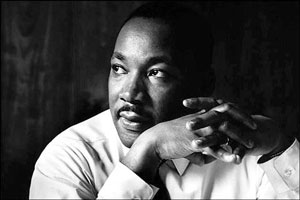
Now that the Dr. King Holiday celebrations are over, what’s next?
The extended celebrations and holiday commemorating the work of Martin Luther King, Jr. will have fleeting meaning if most of us go back to business as usual until this time next year. Celebrations are one thing. Teaching and living the principles King died for is quite another.
When you look at how adults who spend their lives filled with racial prejudice behave, the lasting hope for better race relations, religious tolerance, social justice, must lie with our children and future generations.
Every now and then, we get blatant and ugly reminders — a hanging noose here, an ethnic slur there, as well as other derogatory and demeaning behaviors. Sometimes the reminders become blatantly ugly with someone beaten or killed because of how they look, because of their sexual orientation, or their religious beliefs.
Then there are the less obvious crimes against people because of their color that are with us every day through some form or the other — disenfranchisement born of the disparity between economic classes, the well educated, and the poorly-educated. Someone is denied a job, a home, a loan, a seat in a classroom just because of the color of their skin.
One of the best ways to learn from, and move beyond, the legacy of our forefathers, and our contemporaries who promoted racial hatred and intolerance is to teach our children. And teach them well about the respect and sanctity for all people.
As parents and significant adults in our children’s lives, we need to send an unequivocal and unswerving message: One’s color, one’s ancestry, one’s economic status in life by birth does not automatically make a person either superior or inferior to any other person who may be different.
Imagine how this world would be if we could simply avoid passing on the harmful stereotypes and beliefs of racial hatred to our children. Many destructive and divisive cycles would be broken. In imparting the right lessons and messages to our children, we could finally sow the seeds that would advance human relations by leaps, and bounds.
 King is an example because his concern about human injustice began early in his life.
King is an example because his concern about human injustice began early in his life.
Most of us remember the famous “I Have a Dream” speech, which King delivered during the march on Washington, D.C. in 1963. But the fire that burned within King’s soul, that led him to dedicate his life toward eradicating social evil and injustice, started long before — nearly 20 years earlier when he traveled to Dublin, Georgia as a senior in high school to deliver “The Negro and the Constitution” in an oratory contest. Perhaps, it was just a flicker then, but as you follow his life through college and the seminary, you see that flicker grow into a flame.
The more inhumanity he saw and heard, the more he could not turn a blind eye or a deaf ear. Obviously, adults, whether his parents and others he encountered along the way, implanted and influenced the belief system that governed how he regarded mankind, and his life’s work to make things better.
Time, and time again, we see how difficult it is for many of us to shake the harmful and false perceptions of others that have been passed from one generation to the next. We must take off the blinders and face how these perceptions perpetuate negative influences on the lives of our children, and our grandchildren.
 If we fail to impress upon our children that they must carry on with the fight for dignity and equality, there is little hope for meaningful progress and lasting change. The cycle of racial hatred, religious intolerance, and other insidious practices against each other will never be truly broken. Neither we, nor our future generations of children will ever truly appreciate the beauty and richness that we can only find in our differences.
If we fail to impress upon our children that they must carry on with the fight for dignity and equality, there is little hope for meaningful progress and lasting change. The cycle of racial hatred, religious intolerance, and other insidious practices against each other will never be truly broken. Neither we, nor our future generations of children will ever truly appreciate the beauty and richness that we can only find in our differences.
If King had to choose between commemorating his work with weeks of marches, songs, and readings over us teaching our children every day how to live the principles and practices he fought and died for, he would much rather we teach our children.
Then our children can become the teachers of other children, only then, will the principles King lived and died for become our way of life.
